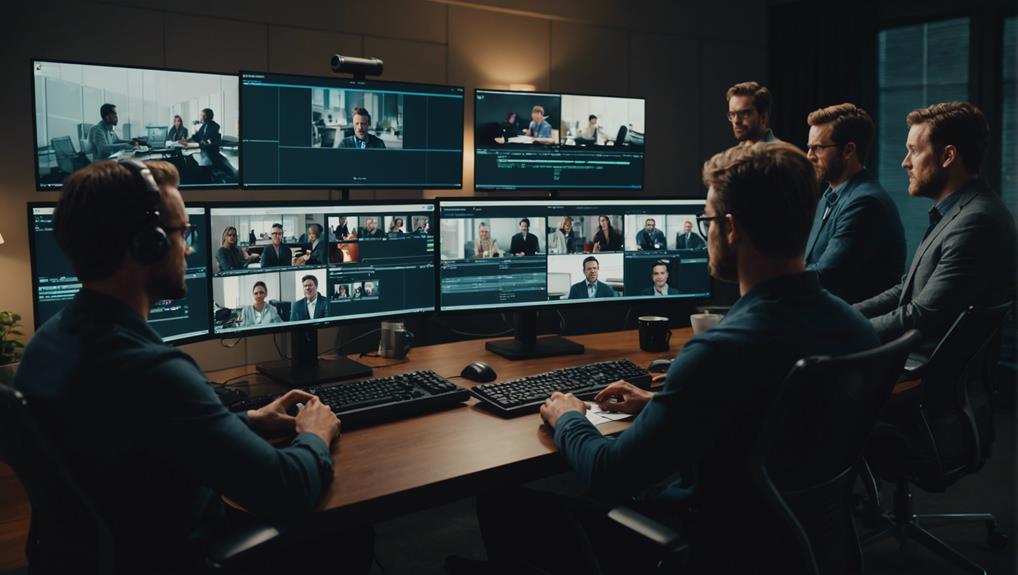Remote Work Feedback and Performance Evaluation Guidelines
To optimize productivity in remote work, establishing clear performance expectations upfront is crucial. Define communication channels and set specific goals and deadlines for key deliverables. Communicate performance metrics to measure success. Keep a foundation of accountability standards with regular check-ins and coaching sessions. Deliver timely feedback promptly and focus on actions that need improvement. Utilize technology tools for monitoring progress and enhancing collaboration. Maintain continuous communication and encourage self-evaluation for growth. Recognize achievements and address performance issues promptly. Embrace peer feedback and conduct fair evaluations. Implement these guidelines for effective remote work performance.
Setting Clear Expectations
To guarantee effective communication and alignment, clearly outline the expectations for remote work performance at the beginning of any feedback and evaluation process. Setting clear expectations is vital in remote work environments to make sure that employees understand what's required of them and how their performance will be evaluated. By establishing clear communication channels and defining performance expectations upfront, you create a foundation for success and accountability standards in remote work settings.
When outlining performance expectations, be specific about the key deliverables, deadlines, and quality standards expected from remote employees. Clearly communicate the metrics by which their performance will be measured, whether it be project completion, sales targets, or other key performance indicators relevant to their role.
Setting clear expectations not only helps remote workers understand their responsibilities but also provides a roadmap for managers to assess performance fairly and consistently.
Regularly revisiting and reinforcing these expectations can help maintain accountability standards and drive productivity in remote work arrangements.
Providing Timely Feedback
Facilitate timely feedback delivery to remote employees to foster continuous improvement and enhance performance outcomes. Providing timely feedback is essential in remote work settings to make sure that employees receive guidance and direction promptly.
When offering feedback, aim to deliver it promptly after observing the behavior or task in question. Timely feedback allows employees to make immediate adjustments, leading to enhanced productivity and performance.
Constructive criticism is a key component of timely feedback. When providing feedback, focus on specific actions or behaviors that need improvement while offering actionable suggestions for enhancement. Avoid vague or overly critical feedback that may discourage remote employees. Instead, frame feedback in a constructive manner that encourages growth and development.
Timely feedback not only addresses current performance but also sets the stage for ongoing improvement. Encourage an open feedback culture where remote employees feel comfortable giving and receiving feedback regularly.
Utilizing Technology Tools
Utilizing various technology tools to facilitate communication and enhance collaboration among remote team members is essential for maintaining productivity and cohesion. Virtual team building activities conducted through video conferencing platforms like Zoom or Microsoft Teams can promote a sense of unity among dispersed team members. These activities could include virtual team lunches, online trivia games, or virtual coffee breaks to encourage informal interactions and team bonding.
In addition to virtual team building, digital performance tracking tools such as Trello, Asana, or Monday.com can help monitor individual and team progress on tasks and projects. These tools provide transparency on project timelines, task assignments, and completion status, allowing for real-time updates and feedback exchange. By utilizing digital performance tracking tools, managers can easily assess the productivity and efficiency of remote team members and address any bottlenecks or challenges promptly.
Integrating technology tools for virtual team building and digital performance tracking ensures that remote teams stay connected, motivated, and accountable, leading to improved collaboration and overall performance.
Encouraging Self-Evaluation
Encourage remote team members to reflect on their own performance through regular self-evaluation sessions, fostering a culture of accountability and continuous improvement.
Self-reflection is a powerful tool that allows individuals to assess their strengths, weaknesses, and areas for development. By promoting self-evaluation, remote workers can take ownership of their performance and actively seek ways to enhance their skills and productivity.
Encouraging a growth mindset within the team can further amplify the benefits of self-assessment. Emphasize the idea that abilities can be developed through dedication and hard work, motivating employees to perceive challenges as opportunities for growth rather than obstacles.
During self-evaluation sessions, advise team members to set specific goals based on their reflections and create actionable plans to achieve them. Encourage open and honest discussions about achievements and setbacks, fostering a supportive environment where individuals feel empowered to take charge of their professional development.
Fostering Continuous Communication
To enhance collaboration and alignment within remote teams, maintaining a culture of continuous communication is crucial. Team engagement thrives on open lines of communication where ideas flow freely and feedback is readily exchanged. Virtual team building activities can also foster a sense of belonging and connectivity despite physical distance.
Remote collaboration is strengthened when team members prioritize regular check-ins, whether through scheduled meetings or informal chats. Encouraging a feedback culture within the team guarantees that communication isn't only frequent but also constructive. Feedback mechanisms should be established to provide a platform for sharing thoughts, addressing concerns, and celebrating successes.
Incorporating tools like messaging platforms, video calls, and project management software can facilitate seamless communication among team members. Clear guidelines on communication expectations, response times, and preferred channels help streamline information flow.
Monitoring Progress Regularly
Regularly monitoring progress is essential for remote teams to stay on track and achieve their objectives efficiently. Implementing weekly check-ins allows team members to provide updates on their tasks, discuss any challenges they're facing, and receive guidance on how to overcome obstacles. These regular touchpoints help in maintaining transparency and accountability within the team.
In addition to weekly check-ins, progress reports play a vital role in monitoring progress regularly. These reports provide a snapshot of each team member's achievements, roadblocks encountered, and the overall progress towards project milestones. By analyzing these reports, team leaders can identify areas that need improvement and offer support where necessary.
Performance metrics serve as concrete indicators of progress and productivity. Establishing clear performance metrics allows team members to understand their goals and track their performance effectively. Feedback loops, where constructive feedback is provided regularly, help in guiding team members towards meeting these performance metrics and improving their overall output.
Recognizing Achievements and Growth
Acknowledging team members' accomplishments and personal development is essential for fostering a positive and motivating remote work environment. Celebrating milestones, whether they're project completions, meeting goals, or personal achievements, plays a significant role in boosting morale and reinforcing a sense of recognition among remote teams. By acknowledging and celebrating these milestones, you not only show appreciation for your team members' hard work and dedication but also inspire them to continue working towards excellence.
In addition to celebrating achievements, tracking improvement is equally important. Regularly recognizing and highlighting the progress team members make in their skills, knowledge, and performance can be a powerful motivator. It not only showcases their growth but also encourages a culture of continuous learning and development within the remote team.
Addressing Performance Issues Promptly
When performance issues arise within a remote team, addressing them promptly is key to maintaining productivity and fostering a culture of accountability and improvement. Remote work presents unique challenges in identifying and resolving performance issues due to the lack of physical proximity and non-verbal cues.
To address these challenges effectively, remote managers should implement clear performance improvement plans that include regular check-ins and coaching sessions.
One solution to addressing performance issues promptly in remote teams is to establish clear communication channels for feedback and discussions. Encouraging open and honest dialogue can help team members feel comfortable discussing areas for improvement and seeking support when needed. Additionally, setting specific goals and expectations can provide a framework for measuring performance and progress.
Coaching plays an essential role in supporting remote employees in overcoming performance challenges. Managers should offer guidance, resources, and constructive feedback to help team members develop the necessary skills and competencies.
Promoting Peer-to-Peer Feedback
Establishing a culture of open communication and constructive criticism among team members is essential for promoting effective peer-to-peer feedback in remote work environments. Encouraging team bonding activities such as virtual coffee breaks, online team building games, or weekly check-ins can foster relationships and create a sense of camaraderie among remote colleagues. These interactions can help team members feel more comfortable providing and receiving feedback from one another.
Skill sharing is another key aspect of promoting peer-to-peer feedback. Encouraging team members to share their expertise, best practices, and unique skills can't only enhance the overall knowledge base of the team but also create opportunities for constructive feedback exchanges. By creating a culture where knowledge sharing is valued, team members can feel more empowered to offer feedback on each other's work while also continuously learning and improving their own skills.
Conducting Fair and Objective Evaluations
When evaluating remote employees, it's important to maintain objectivity in assessments. Fair assessment practices should be implemented to guarantee all team members are evaluated equitably.
It's essential to identify and eliminate any bias factors that may influence the evaluation process.
Objectivity in Evaluations
Maintaining objectivity in evaluations is vital to guaranteeing fair and accurate assessments of remote work performance. By eliminating subjectivity and ensuring fairness, you can conduct evaluations that provide valuable insights into each employee's contributions.
To maintain objectivity, focus on measurable outcomes and specific behaviors rather than vague impressions. Start by establishing clear evaluation criteria that are transparent and easily understood by all parties involved. This helps in reducing bias and ensures that assessments are based on actual performance rather than personal biases.
Additionally, it's essential to gather feedback from multiple sources to gain a thorough understanding of an individual's work. Encourage open communication and provide avenues for employees to share their perspectives during the evaluation process.
Fair Assessment Practices
Establishing a framework for fair assessment practices is important in ensuring objective evaluations of remote work performance. When conducting performance evaluations, it's vital to be mindful of unconscious bias that may skew assessments.
To promote equitable assessments, consider implementing standardized evaluation criteria that focus solely on job-related performance indicators rather than personal preferences or biases. By ensuring that evaluations are based on concrete, measurable metrics, you can minimize the impact of unconscious biases and provide employees with a fair and objective assessment of their work.
Furthermore, it's necessary to train managers and evaluators to recognize and mitigate unconscious bias in the evaluation process. Offering guidance on how to make decisions based on merit rather than subjective opinions can help create a more level playing field for all employees.
Additionally, encouraging open communication and feedback between managers and employees can foster a transparent evaluation process, allowing for constructive discussions on performance without the interference of unconscious bias. Remember, the goal is to conduct evaluations that are fair, unbiased, and focused on performance excellence.
Eliminating Bias Factors
To guarantee fair and objective evaluations of remote work performance, it's vital to focus on eliminating bias factors that may influence the assessment process. Unconscious bias can unknowingly seep into evaluations, affecting judgment on an individual's work. To combat this, it's essential to implement strategies that promote diversity and inclusion within the evaluation framework.
Encouraging diversity in the evaluators themselves can bring different perspectives to the table, reducing the impact of unconscious bias. Additionally, providing training on recognizing and mitigating bias can help evaluators make more informed and equitable assessments.
When conducting remote work evaluations, make sure that criteria for assessment are clear, objective, and directly related to job responsibilities. This clarity helps minimize the potential for bias to sway evaluations. Regularly reviewing evaluation processes and outcomes with a focus on fairness and objectivity can further aid in identifying and addressing any bias factors that may arise.
Conclusion
To sum up, when it comes to remote work feedback and performance evaluation, clarity is key. Setting expectations, providing timely feedback, utilizing technology, and promoting open communication are essential for success.
Remember, communication is the lifeline of remote work, like a river flowing through a desert, nourishing growth and progress.
By following these guidelines, you can guarantee that your remote team thrives and achieves their full potential.







